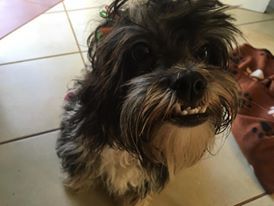Meet Pepper. She's six months old and loves to chew. On everything. Shoes, power cords, furniture, toes--you name it, Pepper wants it in her mouth. But a puppy who chews (especially on people) can become a grown dog who bites, and we don't like that idea.
So we're teaching Pepper not to chew on things we don't want her to chew on, especially us. These days, we put a toy in Pepper's mouth instead of our fingers or toes when she starts to chomp. And since Pepper is easily distracted, she's happy to chew on her toy instead.
After substituting a dog toy for my shoe or foot a number of times, it hit me. Pepper the puppy is a perfect metaphor for my mind. Without discipline, my mind runs wild--finding topics to chew on until they're destroyed. I was a child who worried that grew into an adult with anxiety--and now much of the time my mind is as untamed as a new puppy. Without direction, its practiced tendency leans toward worry.
But my mind is also trainable. If I give it a project--a toy for my mind to chew on--it chills out and focuses. That's where mindfulness techniques come in really handy for me. When my mind is chewing on something that will only lead to strife--worry about the world, my family, or my role in either, without any productive outcome--shifting my focus to my breath, a mantra, or my five senses can really help.
Daydreaming can be an equally helpful tool. It's far from the here and now of mindfulness, but if the content of my daydream is positive, it's a whole lot better than worrying. Lately, I'm writing a novel in my head. I go back to it whenever I have time, and the story keeps getting more detailed and elaborate. Maybe one of these days I'll write it down, but for now, the novel in my head is helping to tame my puppy mind.
The good news is, our minds can easily learn new tricks, no matter how old of a dog we are. Thanks to neuroplasticity, our repetitive thoughts shape the way our brains interpret our world, which influences our words and actions. And since thoughts can be changed, perceptions can shift, and words and actions will follow.
Training your mind, like training a puppy, can feel like a lot of work. But the joy, contentment, and peace that are possible make every bit of work more than worth it.
So, what is your mind chewing on these days that you'd rather not be spending so much time thinking about? What toy can you give it to chew on instead? You could try a few mindfulness practices, or find whatever your equivalent is to a novel that you write in your head. Or perhaps your new mental hobby can involve creating solutions to help make the world a better place.
Whatever new tricks you teach your puppy mind, trust that the power of neuroplasticity is on your side--our brains remain trainable throughout our lives.
